Tributes for US journalist, Afghan colleague killed by Taliban
David Gilkey and Zabihullah Tamanna were killed on Sunday while they were travelling with Afghan army unit in Helmand
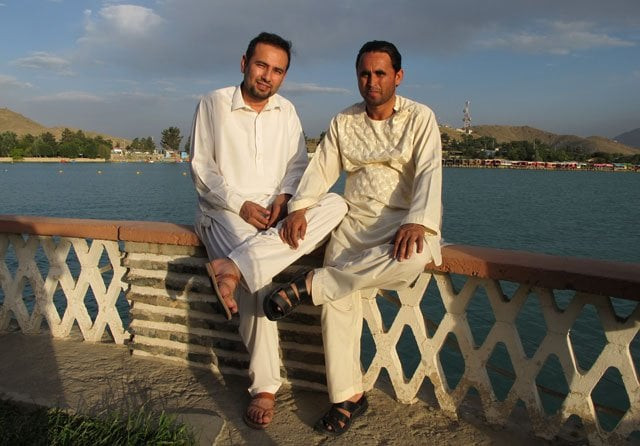
This photograph taken on July 10, 2014 shows National Public Radio (NPR) interpreter Zabihullah Tamanna (L) as he poses with a friend at the Qargha Lake on the outskirts of Kabul. PHOTO: AFP
Gilkey and his colleague, 38-year-old Zabihullah Tamanna, were killed on Sunday while they were travelling with an Afghan army unit near the town of Marja in the volatile opium-rich province of Helmand.
Two other National Public Radio (NPR) journalists travelling with Gilkey in a separate vehicle, reporter Tom Bowman and producer Monika Evstatieva, were unharmed.
"David has been covering war and conflict in Iraq and Afghanistan since 9/11. He was devoted to helping the public see these wars and the people caught up in them. He died pursuing that commitment," said Michael Oreskes, NPR's senior vice president of news and editorial director.
"As a man and as a photojournalist, David brought out the humanity of all those around him. He let us see the world and each other through his eyes."
Seven killed as Taliban gunmen raid Afghan courthouse
Gilkey's colleagues responded with shock at the news of his sudden death, the first time in NPR's 46-year history that it has lost a journalist on a reporting assignment.
One co-worker Audie Cornish tweeted that Gilkey was among the company's "greatest journalists," and his death was "an unimaginable loss".
Tributes also poured in for Tamanna, a father of three young children, as Afghan journalists gathered outside his house in Kabul to offer condolences.
"We are shocked and saddened by the killing of Zabihullah Tamanna, who loved his job in the media," said Afghan journalist Abdul Halim, a close friend. "He wanted to serve his people through journalism."
A Taliban hotbed, the province of Helmand is almost entirely under the control of the militants, waging a deadly insurgency against the Western-backed Afghan government.
Afghan military spokesperson Ahmad Shakil Tasal said Gilkey and Tamanna, who was hired as a translator, were heading to Marja to cover an army operation when they were hit by a Taliban rocket.
"Even though much of the world's attention has shifted away, let no one doubt that Afghanistan remains a dangerous place for journalists - local and foreign - working to cover that protracted conflict," said Bob Dietz, the Asia program coordinator at the Committee to Protect Journalists (CPJ), a press freedom group.
"We are deeply saddened by the deaths of Zabihullah Tamanna and David Gilkey. There are too many journalists who have given their lives to tell the Afghan story."
Taliban bomber kills three at Afghan police training centre
Afghanistan is among the most dangerous countries in the world for journalists. Prior to the deaths of Gilkey and Tamanna, 24 journalists and one media worker have been killed in Afghanistan since the 2001 US-led invasion, said the CPJ.
US Secretary of State John Kerry praised Gilkey as a "gifted storyteller", and paid tribute to "intrepid journalists - and their interpreters - trying to convey that important story to the rest of the world".
A "devastated" NPR president and CEO Jarl Mohn said "horrific incidents like this remind us of the important role journalists play in America's civic life. They help us understand beyond the headlines and see the humanity in others."
Gilkey received a 2007 national Emmy award for a video series about Michigan Marines in Iraq.
"The things to do were amazing and the places to see were epic," he once said. "But the people, the people are what made it all worth the effort."
His photography also helped earn NPR a Peabody Award for its coverage of the Ebola epidemic.
"His coverage in Africa put a face to a disease and refused to let listeners think of the stricken individuals as separate from our own families," NPR said.
"He made a global story very personal." His role in an NPR investigation on veteran medical care helped the outlet earn a 2010 George Polk Award, Society for News Design's 2011 Award of Excellence and a 2011 Dart Award for Excellence in Coverage.
In 2004, Gilkey was named Michigan "Photographer of the Year" by the Michigan Press Photographers Association.

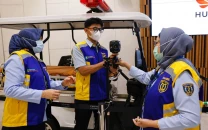

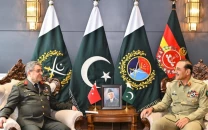
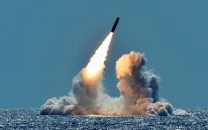

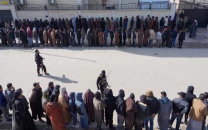












COMMENTS
Comments are moderated and generally will be posted if they are on-topic and not abusive.
For more information, please see our Comments FAQ